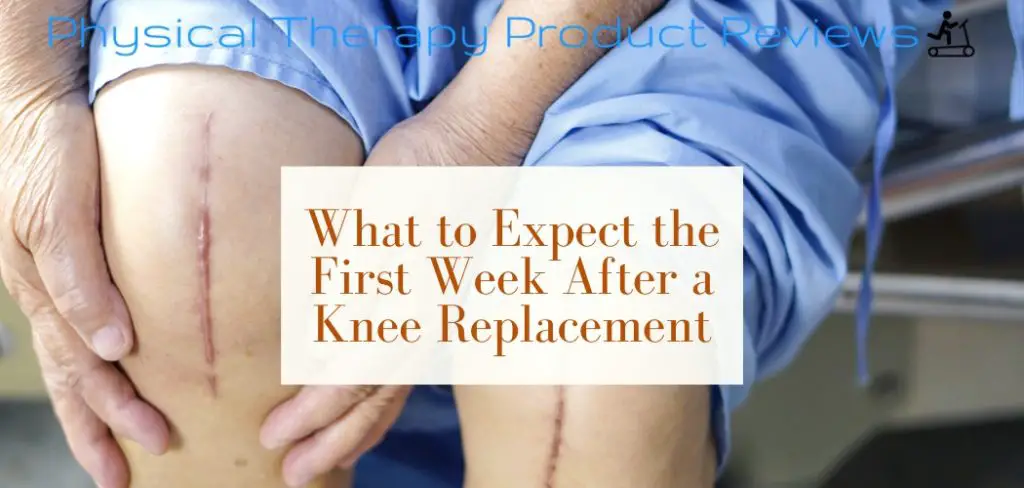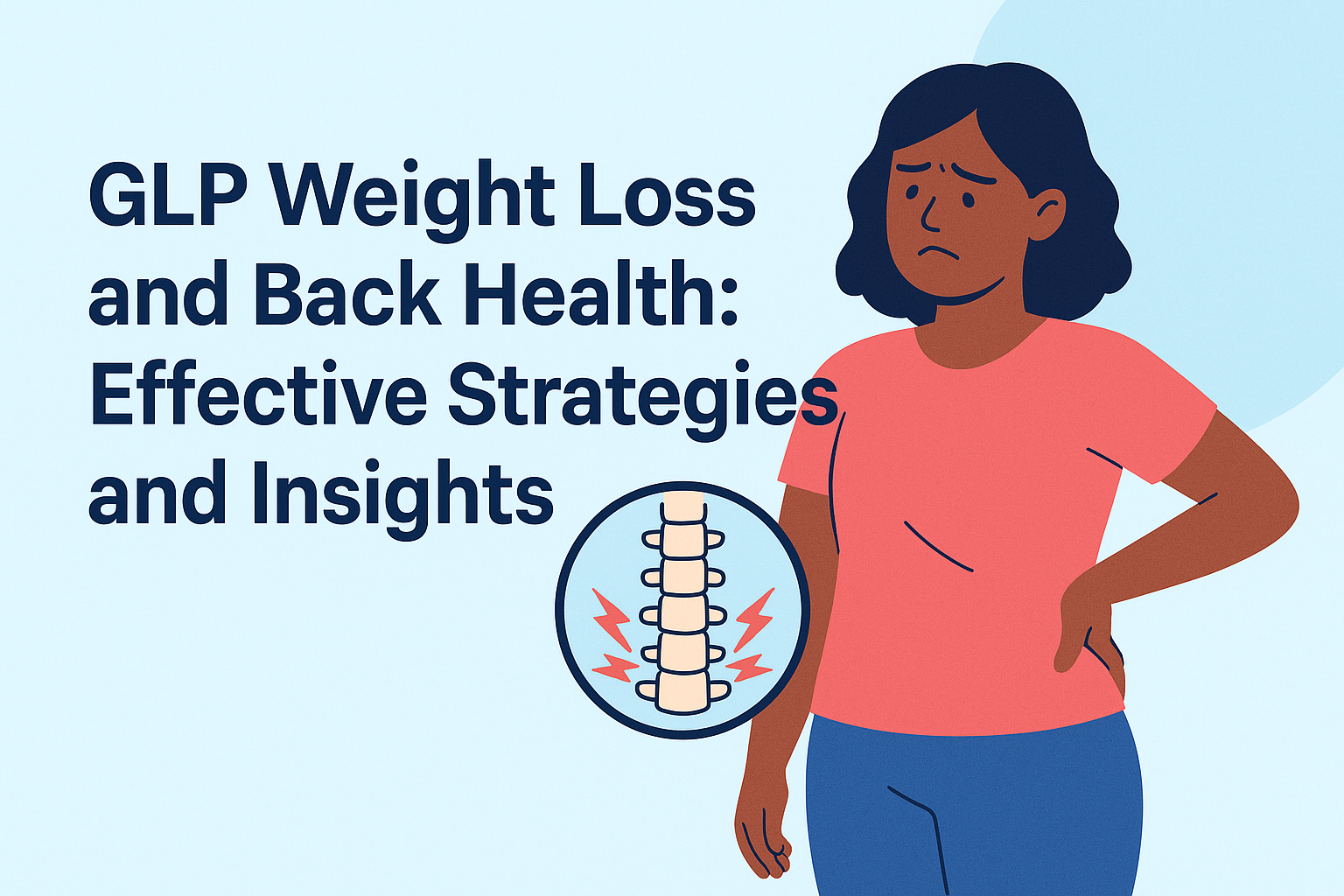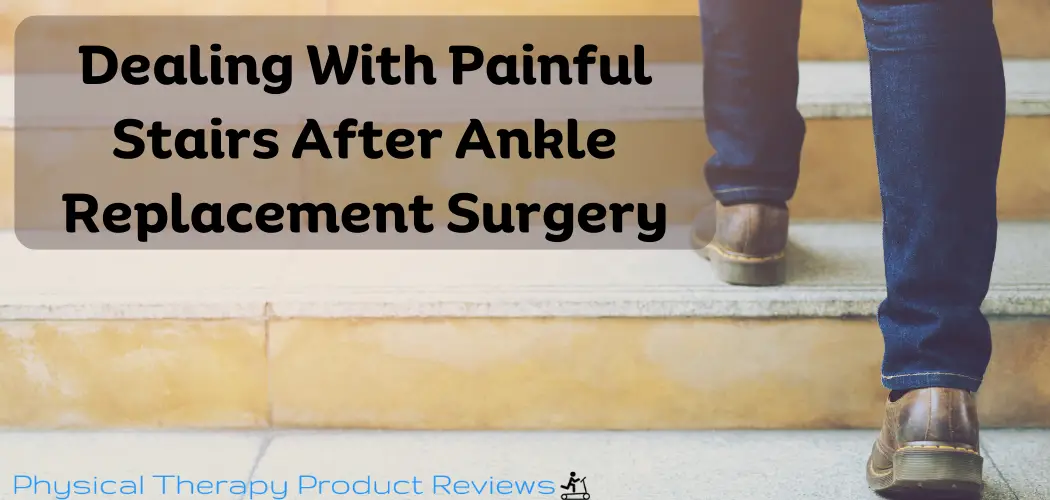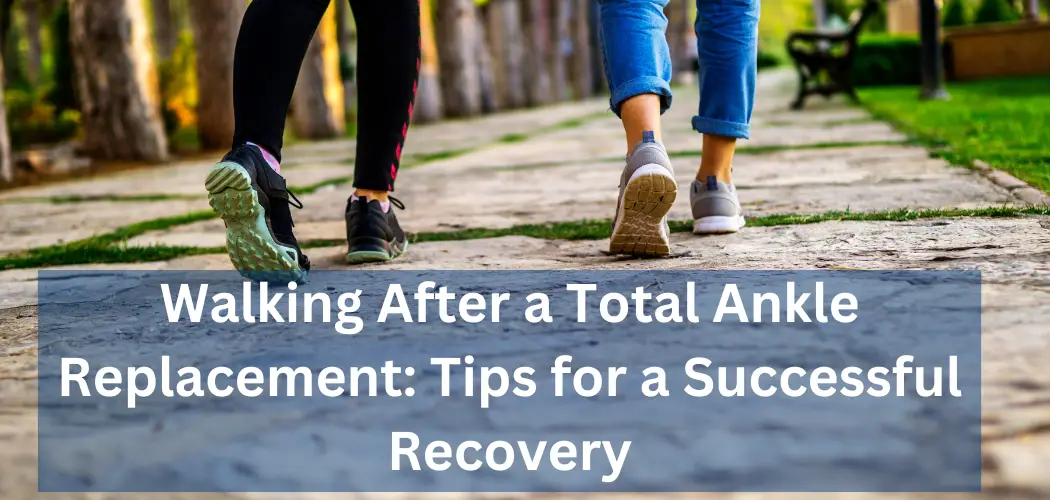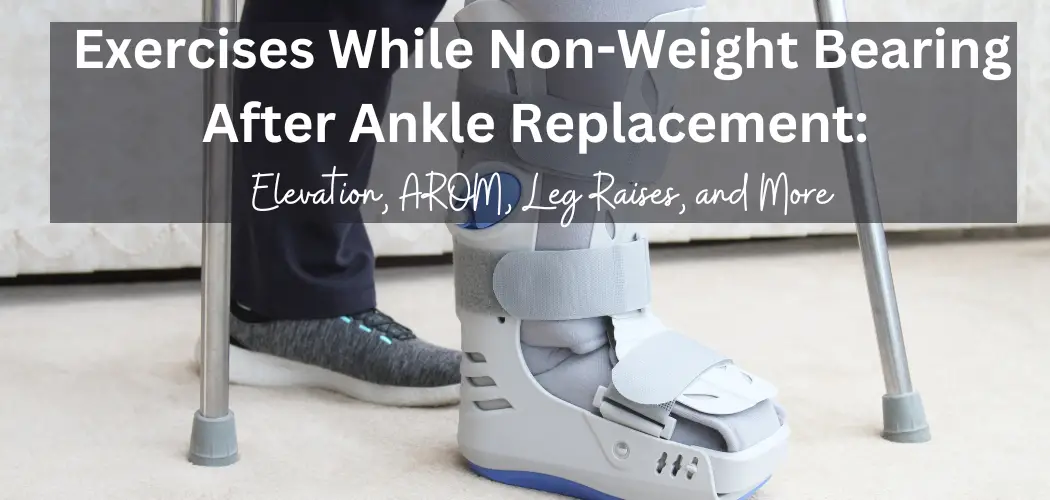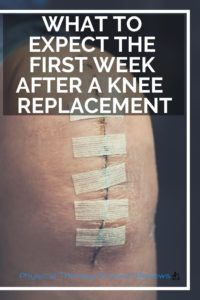 The first week after a total knee replacement can be a complete roller coaster. Your anxiety has likely been building for months about your impending knee replacement surgery, and now that it’s over, you’re ready to get your life back.
The first week after a total knee replacement can be a complete roller coaster. Your anxiety has likely been building for months about your impending knee replacement surgery, and now that it’s over, you’re ready to get your life back.
The first couple of days are exciting, and energy levels are high, but as the week progresses, the recovery gets harder. It slowly begins to hit you that you’ve got a long way to go, and you just started.
Hopefully, by knowing what to expect, you will not only survive the first week but set yourself up for success.
Your goals for the first week include:
- Recover from the surgery
- Gain Range of Motion
- Start to Improve your Walking
- Improve your Pain Control
- Be Prepared for This to Get Worse Before They Get Better.
Get Your Pain Under Control
The Pain will get Worse Before it gets Better
Something that often surprises people during the first week is that the pain worsens as the week goes on.
Despite the surprise, it makes a lot of sense. You are no longer on medication. You’re cutting down the narcotic medication, the delayed effects of the surgery, such as bruising, begin to appear each day, and you’re trying to move your knee as much as possible to gain range of motion.
It’s a tough pain combo.
An insiders tip: Movement is a great way to help with pain control
In addition to using the prescribed pain medication, we recommend using ice, heat, and movement to keep the joint loose and frequent bouts of walking.
Many other items can help with pain control after a total knee replacement that we’ve shared previously.
Don't Let Pain Prevent You From Sleeping
Sleeping is essential for healing, but it can be challenging after surgery. It isn’t easy to find that comfortable position, and your knee will wake you up multiple times a night in the first week.
You can find our best recommendations for a better night’s sleep in this guide we prepared all about sleeping after a knee replacement. Some other helpful tips
- Make sure to sleep with your knee straight – don’t sleep with a pillow underneath your knee, or you may lose knee extension range of motion overnight.
- Your best bet might be sleeping in the recliner for the first week. You can keep your knee straight while still being able to keep it straight.
- Try using ice or heat right before bed to help you fall asleep easier and stay asleep longer.
- Have your next pain pill and ice machine ready for a quick swap in the middle of the night
- Try a TENs unit to help numb the pain while your sleeping
When you are ready to transition back to bed, you might have better luck with an orthopedic pillow set from Lunix to adjust your body position
Rehab is Extremely Important Especially in the First Two Weeks
We can’t stress enough that you have to be focused on your physical therapy to gain range of motion, improve muscle strength, and decrease pain levels. You will likely be going to therapy 2-3x a week for the first 2 weeks and will be given a home exercise program.
These will be similar to your exercises before your knee replacement. This is not the time to all of a sudden get lazy.
You’ll need to do your exercises multiple times a day and 5-6x a day in the first week.
After a total knee replacement, the secret to success is to move the knee as much as possible. Bend it, straighten it, and walk on it as much as possible. Don’t Get Lazy Now.
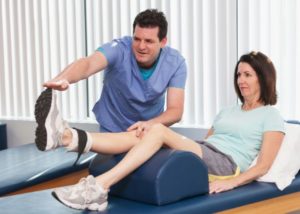 There are multiple exercises and stretches to do in the first week. The main focus of therapy should be:
There are multiple exercises and stretches to do in the first week. The main focus of therapy should be:
- Get full knee extension
- Improve quadriceps muscle strength and control
- Improve walking and weight bearing with a walker
- Get to at least 90 degrees of flexion by week 2
- Decrease pain and swelling
See our favorite exercises to focus on in the first week after a knee replacement.
Mental Fatigue Is Real And Wants to Let You Know It
It’s easy to forget that you’ve been through a lot in the 1st week. You’ve been anxious and nervous about a significant surgery. You likely just spent 1-3 nights in the hospital with poor sleep and tubes running everywhere.
There is a high likelihood that you haven’t slept well in a few days, and by the time you get back home and settled, you’re going to be spent. Trust us on this one.
The best way to help with mental fatigue is to do as much preparation before surgery as possible so that you are stress-free.
Mental fatigue will inevitably set in once you get home from the hospital. Be ready for it. We recommend trying your best to catch up on sleep. If you are having trouble sleeping, we recommend trying to sleep in a recliner.
Have a great book ready to read, and rely on your spouse or friends for the first few days to get your feet underneath you on lifting and doing some house chores. Other tips to get through this
- Stay on top of your pain regimen – it’s hard to play catch up on pain, but much easier to stay ahead.
- Prep multiple meals the week before your surgery.
- Clean your house before surgery, so you come home to everything done and put away
- Learn to meditate or perform deep breathing daily to help with both control and anxiety setting in
Missed Expectations on Recovery
If this is your first knee replacement, it’s important to reset your expectations after surgery. Surgeons often undersell the seriousness and pain levels after surgery. There is this expectation that your new knee is fixed once the surgery is over, and you hop up and start skipping out of the hospital. This is far from the truth.
The most difficult time of recovery after a knee replacement is at the end of the first week or just starting the second week.
The drugs are wearing off, and the knee hurts, it feels stiff all the time, and everyone feels like they should be further ahead than they currently are.
Be prepared for this low point after surgery and fight through it. On the other side of this downtrend are progress and pain relief.
By the end of the second week, you’ll start to sleep better, use less pain medication, and begin to walk without a walker.
Relaxing on the Couch is for the Healthy - Not for After Surgery
Again this comes down to missed expectations. If you are anticipating that you will have the surgery and then kick back in the recliner and wait for the knee to heal you are going to out of luck. Recovering from a knee replacement takes work!
Instead of asking for someone to grab your food or a drink of water, get up off the couch to get yourself to make you move. You need the walking and movement, create a spreadsheet or a way to track when and how often you’ve done your exercises. It’s should be multiple times a day!

We’ve had people not put in the work and sit on their behinds instead of working hard for a full recovery. These patients don’t get their range of motion back and often end up with a muscle contracture.
This means their joints and muscles tightened up so badly that they can’t fully move the joint. These patients had to under manipulation under anesthesia which is extremely uncomfortable.
Then you’ll have to go to therapy 5 times a week to prevent further scar tissue build up.
Sleeping After a Knee Replacement is a Pain… Literally
To put it simply, sleeping is a pain for the first 3-4 weeks. It’s no surprise that sleeping after major knee surgery is difficult and it’s no different after a knee replacement. You will be less active during the day and therefore less sleepy when bedtime comes around. Here are some simple tips to try now:
Try and time your pain medication so that you take your pain medication 30-60 minutes before bedtime.
This will help you fall asleep easier and hopefully, you’ll only wake up once for a pain pill in the middle of the night.
Try icing or using heat right before bed. Yes, heat is fine you use despite what you may hear from others.
Heat starts the healing pathway and promotes local healing through increased blood flow. Whichever you choose, use it right before bed.
A great option is an automatic icing machine that has an auto shut off feature that we love. You can put it on before bed, fall asleep and the circulating ice machine shuts off.
You may have to sleep in a recliner for the first week. This is fine and often the most comfortable position for people. Just be sure to raise the footrest so that the knee is straight and swelling can drain out of your leg overnight. Remember, try to keep the knee straight through the night to get full knee extension back.
Aches and Pains You Never Knew About Will Start to Act Up
If you have any other aches and pains that you have dealt with in the past, then be aware that they will likely make their presence known again. A few factors that can flare up old injuries:
- You are limping and walking abnormally
- Muscles are guarded and tight to protect the new surgery
- You are stressed and anxious after surgery, causing muscles and joints to be stiff
This presents a recipe for irritating other joints. If you have had back, hip, or neck pain before surgery, we recommend you continue doing your exercises or normal treatment for those areas.
Back pain is widespread after a knee replacement, so take steps to care for it before it gets flared up or limits your knee recovery. See our top recommended items for some helpful pain relief options for low back pain.
Caregiver Fatigue Will Happen
Caregiver fatigue is real and something to be aware of, especially towards the end of the first week after surgery. Your significant other has put their life on hold for a whole week to cater to your every need, and they will want to get back to their everyday lives.
A few things to think about is that your caregiver has already been through the past few months when you were in debilitating pain already, and they are probably doing more than their fair share at home to help.
They have been up in the middle of the night helping with pain when you could sleep and have been hanging around the house if you need anything.
They are probably tired and ready to do something they enjoy.
A few tips to consider and how to help:
- You’ve been in pain and likely more irritable than usual. (Say you’re sorry!)
- They’ve put their life on hold for the past recovery
- They’ve cooked, cleaned, and dressed you when needed
To show your appreciation, do something nice for your caregiver and break up the routine you’ve established after surgery. Go out to dinner for a quick bite, give a neck rub, or get a gift card to their favorite store.
In Review
The first week after a knee replacement can be a roller coaster of emotional, physical, and mental stress. If you are prepared for it you’ll more easily be able to get through it and set yourself up for the fastest recovery.
Other Great Rehab Related Articles
GLP Weight Loss and Back Health: Effective Strategies and Insights
How to Stay Active After Cervical Fractures: Expert Tips and Advice
Dealing with Painful Stairs After Ankle Replacement Surgery
Walking After a Total Ankle Replacement: Tips for a Successful Recovery
Exercises While Non-Weight Bearing After Ankle Replacement: Elevation, AROM, Leg Raises, and More
Ankle Pain with Stairs: Causes and Home Treatment Options
Disclaimer: The information provided in this post is for educational purposes only. This is not a substitute for a medical appointment. Please refer to your physician before starting any exercise program.
